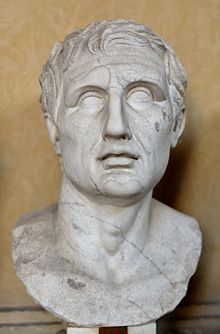Menander
| Menander | |
|---|---|

Bust of Menander. Marble, Roman copy of the Imperial era after a Greek original (ca. 343–291 BC).
|
|
| Born | 342/41 BC Kephisia, Athens |
| Died | c. 290 BC |
| Education | Student of Theophrastus at the Lyceum |
| Information | |
| Genre | New Comedy |
| Notable work(s) | |
Menander (/məˈnændər/; Greek: Μένανδρος, Menandros; c. 342/41 – c. 290 BC) was a Greek dramatist and the best-known representative of Athenian New Comedy. He wrote 108 comedies and took the prize at the Lenaia festival eight times. His record at the City Dionysia is unknown but may well have been similarly spectacular.
One of the most popular writers of antiquity, his work was lost during the Middle Ages and is known in modernity in highly fragmentary form, much of which was discovered in the 20th century. Only one play, Dyskolos, has survived almost entirely.
Menander was the son of well-to-do parents; his father Diopeithes is identified by some with the Athenian general and governor of the Thracian Chersonese known from the speech of Demosthenes De Chersoneso. He presumably derived his taste for comic drama from his uncle Alexis.
He was the friend, associate, and perhaps pupil of Theophrastus, and was on intimate terms with the Athenian dictator Demetrius of Phalerum. He also enjoyed the patronage of Ptolemy Soter, the son of Lagus, who invited him to his court. But Menander, preferring the independence of his villa in the Piraeus and the company of his mistress Glycera, refused. According to the note of a scholiast on the Ibis of Ovid, he drowned while bathing, and his countrymen honored him with a tomb on the road leading to Athens, where it was seen by Pausanias. Numerous supposed busts of him survive, including a well-known statue in the Vatican, formerly thought to represent Gaius Marius.
...
Wikipedia
